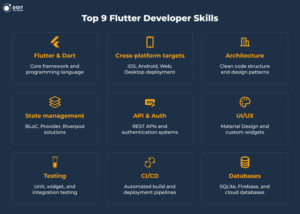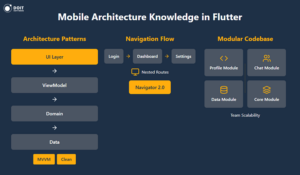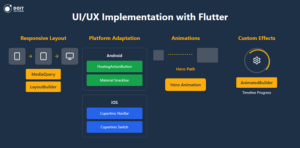Hiring a Flutter developer in 2025 means looking beyond mobile apps. The toolkit has grown far beyond iOS and Android and now powers Linux, Windows, macOS platforms, web apps, Fuchsia, and even automotive interfaces. And no matter what platform you’re building for, the right Flutter developer will shape your app’s stability and user experience from the first line of code.
But how do you know what to look for? In this guide, you’ll find out the must-have Flutter developer skills, including both technical capabilities and tool choices. Keep reading to get a clear checklist to evaluate candidates and make faster hiring decisions.
Let’s start with what Flutter developer skills actually mean in practice.
Flutter developer skills are the technical and practical abilities that enable a developer to build, maintain, and optimize applications using the Flutter software development kit.

A skilled Flutter developer can create cross-platform apps for mobile, web, desktop, and embedded environments from a single codebase. These skills include proficiency with Dart, UI design, state management, API integration, performance tuning, and multi-platform deployment.
An experienced Flutter developer’s skills and responsibilities usually cover the following:
So, which specific skills for Flutter developers matter most? Let’s find out.
Here’s a practical breakdown of the skills required for Flutter developer roles:
Flutter and Dart proficiency
Async/await, Futures, Streams, null safety, widget structure, Flutter CLI usage
Cross-platform development
iOS/Android, web, desktop, platform channels, native integration
Mobile architecture
MVVM, Clean Architecture, modular codebase, navigation patterns
State management
Provider, Riverpod, Bloc, state handling strategy, and consistency
API communication
REST/GraphQL, OAuth2, JWT, WebSockets, error handling, secure storage
UI/UX implementation
Responsive layout, animations, Material/Cupertino widgets, accessibility
Testing and debugging
Unit/widget/integration tests, Flutter DevTools, golden tests, crash tracking
CI/CD pipelines
Git workflows, automated deployments
Database integration
SQLite, Hive, Firebase, REST APIs to cloud DBs
Let’s take a look at each Flutter developer skill in detail.

First of all, the Dart programming language forms the foundation of every Flutter application. Thus, your Flutter developer must demonstrate fluency in Dart’s async programming model, including Futures and Streams for handling asynchronous operations. They should understand null safety to prevent runtime errors and know how to structure widgets efficiently.
Here are the key Dart concepts you should assess in Flutter developer skills:
Beyond Dart basics, assess their knowledge of the Flutter framework. A skilled developer leverages Flutter CLI commands for project setup and uses hot reload to speed up development cycles. They also understand how to configure cross-platform build settings from the start.
As we already know, cross-platform support is Flutter’s biggest strength, but only if the developer knows how to manage platform-specific differences.
As a basis, your Flutter developer should have hands-on experience building for both iOS and Android from a single codebase. They should understand platform-specific design patterns and navigation paradigms.
Beyond mobile, modern Flutter developers work with web deployments and desktop applications for Windows, macOS, and Linux. They know how to use platform channels to integrate native code when needed.
Some developers even have experience with automotive systems (Android Automotive) or Google’s Fuchsia OS, though these remain specialized areas.

Next, review how the developer organizes app logic. Strong architecture patterns prevent your app from becoming unmaintainable as it grows. Flutter developers should implement patterns like MVVM (Model-View-ViewModel) or Clean Architecture to separate business logic from UI code.
They need to structure navigation flows that make sense across different screen sizes and orientations. For that purpose, they should understand Flutter’s Navigator 2.0 for complex routing scenarios and create modular features that teams can develop independently.
After confirming cross-platform experience, evaluate how candidates handle app data flow.
State management skills determine whether your app performs smoothly or struggles with complex user interactions.
When interviewing Flutter developers, ask about their state management experience. Strong candidates can name specific tools they’ve used and explain their project choices.
Look for hands-on experience with these popular solutions:
Assess their decision-making around state complexity. Experienced Flutter developers explain when they use local widget state versus global solutions. They understand performance trade-offs between different approaches and can describe strategies for preventing memory leaks.
Modern apps constantly connect to backend services, and all skilled Flutter developers need expertise in these integrations with REST APIs. They should handle error states gracefully and implement retry logic for failed requests.
Usually, Flutter developer skills in API & Auth integration include:
REST API experience should include handling HTTP requests, error management, and data serialization. Developers should demonstrate knowledge of popular packages, such as HTTP or Dio, for network communication.
GraphQL knowledge becomes valuable for apps with complex data requirements. Candidates familiar with GraphQL can implement more efficient data fetching and reduce network overhead compared to traditional REST approaches.
OAuth2 and JWT handling skills protect user authentication flows. Thus, you should look for experience implementing social logins and secure storage of authentication credentials using packages like flutter_secure_storage.
Finally, WebSocket implementation enables real-time features, such as chat or live updates. This capability becomes particularly important for apps that require instant communication between users or real-time data synchronization.
Now it’s time to check how well your Flutter developer translates designs into real interfaces.

First, Flutter programmers must use MediaQuery and LayoutBuilder to create layouts that adapt to any screen size.
Next, they should implement platform-appropriate designs using Material widgets for Android and Cupertino widgets for iOS.
Also, look for experience with Hero animations for smooth transitions and AnimatedBuilder for custom effects.
Flutter developers usually write unit tests for business logic, widget tests for UI components, and integration tests for complete user flows.
Here are the preferred Flutter developer skills for testing:
Unit tests
Test individual functions and classes
flutter_test, mockito
Widget tests
Verify UI components work correctly
flutter_test, golden_toolkit
Integration tests
Test complete user workflows
integration_test package
Golden tests
Catch visual regressions
golden_toolkit
For debugging, developers rely on Flutter DevTools to inspect widget trees and track performance. They integrate crash reporting through Firebase Crashlytics or similar services to quickly identify and resolve production issues.
Check out our article “How Much Does It Cost to Hire an App Developer? A Rate Breakdown“
After verifying testing capabilities, assess how Flutter candidates handle data storage and retrieval.
Database skills determine whether your app can scale efficiently and work offline when needed.
Ask Flutter developers about their experience with different storage solutions. Strong candidates can compare local and cloud options based on project requirements. They should understand when to prioritize performance versus real-time synchronization.
Evaluate their knowledge of local storage options first:
Then, assess their cloud database experience:
Experienced Flutter developers can explain data caching strategies for scenarios with poor connectivity. They should understand sync conflicts that occur when multiple users edit the same data and be able to describe resolution approaches that maintain data integrity.

As one of the last steps, professional Flutter developer skills should include experience with smooth deployment processes. And that’s because you should look for proficiency in Git for version control and creating clean commit histories. Skilled Flutter developers implement pull request workflows that maintain code quality.
Additionally, you can look for experience with automation tools such as Codemagic or Fastlane, which handle building and deploying to multiple platforms. Your Flutter developer should configure these pipelines to run tests automatically and manage different build flavors for development and production environments.
All in all, Flutter developer skills in 2025 encompass far more than mobile app creation. From Dart proficiency to multi-platform deployment, each skill contributes to building applications that users love across every device they own.
Finding developers with this complete skill set takes time and technical expertise that many hiring teams lack. That’s where the evaluation process often breaks down, leading to costly hiring mistakes.
DOIT bridges this gap by connecting companies with pre-vetted Flutter developers who have undergone comprehensive technical evaluations, soft skills assessments, and cultural fit interviews. If you need to hire skilled Flutter developers, share your project requirements and receive qualified candidate profiles within days.
Share your requirements and receive the first relevant CVs within days.
Request CVsA Flutter developer creates cross-platform applications using Google’s Flutter framework and Dart programming language. They build user interfaces, implement business logic, integrate APIs, and deploy apps to multiple platforms, including iOS, Android, web, and desktop from a single codebase. Flutter developers can also maintain existing applications and optimize their performance.
Flutter uses Dart as its primary programming language. Dart is an object-oriented language developed by Google that compiles to native code for mobile and desktop platforms, as well as to JavaScript for web applications. Developers must master Dart’s features, including async programming, null safety, and its rich standard library, to build effective Flutter applications.
Flutter developer required skills include Dart programming proficiency, understanding of Flutter’s widget system, state management expertise (Provider, Riverpod, or Bloc), API integration capabilities, responsive UI design skills, and testing knowledge. Developers also need experience with debugging tools and deployment processes for multiple platforms.
While Flutter doesn’t have an official certification program from Google, developers can demonstrate expertise through the Google Developer Expert (GDE) recognition for Flutter. Additionally, completing Flutter courses on platforms like Udemy or Coursera with certificates shows commitment to learning. However, a strong portfolio of deployed Flutter apps often carries more weight than certifications when evaluating Flutter developer qualifications.










